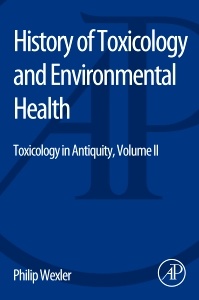History of Toxicology and Environmental Health Toxicology in Antiquity II History of Toxicology and Environmental Health Series
Auteur : Wexler Philip

1. Murder, Execution and Suicide in Ancient Greece and Rome2. Chemical and Biological Warfare in Antiquity3. Anthropogenic Air Pollution in Ancient Times4. Poisoning in Ancient Rome: Images and Rules5. Snake as a Symbol of Toxicology in Ancient Greece and Roman Empires6. Drugs, Suppositories and Cult Worship in Antiquity7. Kohl Use in Anquity: Effects on the Eye8. "Gleaming and Deadly White:" Toxic Cosmetics in the Roman World9. Poisonous Medicine in Ancient China10. The Venomous Virgin: Fact or Fantasy?11. Mushroom Intoxication and Religion in Mesoamerica12. Entheogens in Ancient Times: Wine and the Rituals of Dionysus13. Entheogens (Psychedelic Drugs) and the Ancient Mystery Religions
Phil recently retired from a long federal career as a Technical Information Specialist at the National Library of Medicine’s (NLM) Toxicology and Environmental Health Information Program, within its Specialized Information Services Division (SIS). His initial position at NLM was as a Fellow of its Associate Program and early work included a brief stint in the Reference Services Section. A recipient of the NLM Regents Award for Scholarly or Technical Achievement and the Distinguished Technical Communication Award of the Washington chapter of the Society for Technical Communication, he was team leader for the development of the ToxLearn online multi-module tutorials, a joint activity with the SOT. Phil had also been project officer for the LactMed file on drugs and lactation, and the IRIS (Integrated Risk Information System) and ITER (International Toxic
- Provides the historical background for understanding modern toxicology
- Illustrates the ways ancient civilizations learned to distinguish safe from hazardous substances, how to avoid the hazardous substances and how to use them against enemies
- Details scholars who compiled compendia of toxic agents
Date de parution : 09-2014
Ouvrage de 152 p.
15x22.8 cm
Thèmes de History of Toxicology and Environmental Health :
Mots-clés :
Toxicology; science history; ancient civilization; environmental health



